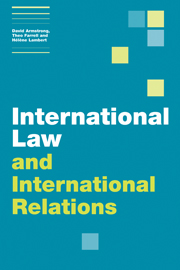1 - The nature of international law
Published online by Cambridge University Press: 05 June 2012
Summary
Two kinds of theoretical perspectives have frequently been employed to cast doubt on the significance of international law. The first, which is located within the branch of legal theory known as ‘positivism’, argues, in essence, that law as such is distinguished from broader and looser normative structures by its imperative nature. In the most famous version of this, by the nineteenth-century English jurist John Austin, ‘law properly so-called’ is the command of a sovereign backed by coercive sanctions. Since states in the international system acknowledge no sovereign body other than themselves and since powerful states cannot be forced to take or refrain from taking actions against their will, international law cannot be considered true law. As Austin puts it, the duties which international law imposes do not have the obligatory character of true law because they ‘are enforced by moral sanctions, by fear on the part of nations, or by fear on the part of sovereigns, of provoking general hostility, and incurring its probable evils, in case they shall violate maxims generally received and respected’. The second theoretical perspective is drawn from that body of theoretical reflection within International Relations (IR) known as ‘realism’. This asserts that states exist in an overall context of international anarchy which impels them towards ceaseless competition in pursuit of their separate interests. In the inevitable struggle for power that ensues, neither moral nor legal principles will significantly constrain states, and co-operation among them will always be limited and short term.
- Type
- Chapter
- Information
- International Law and International Relations , pp. 9 - 33Publisher: Cambridge University PressPrint publication year: 2007



